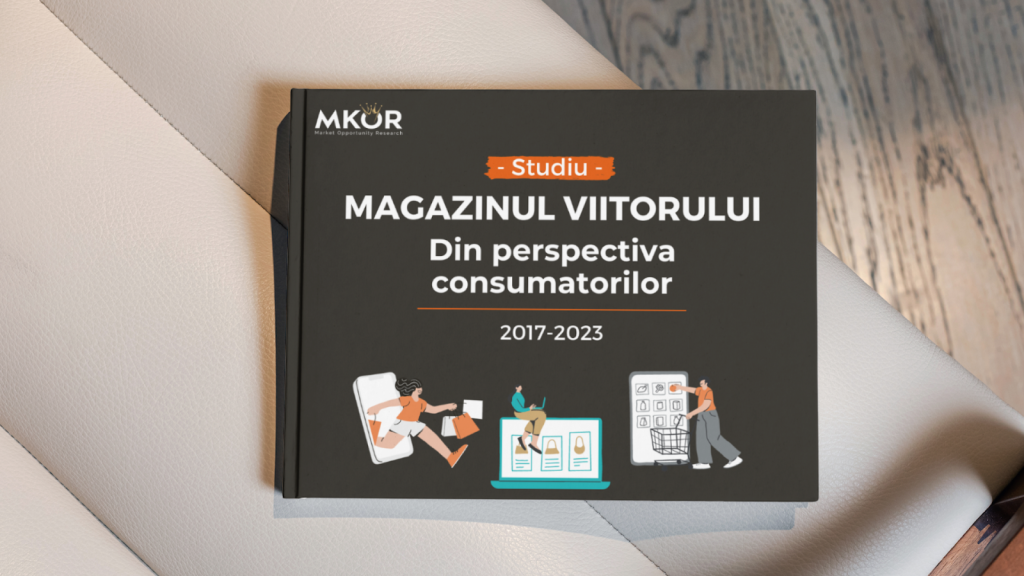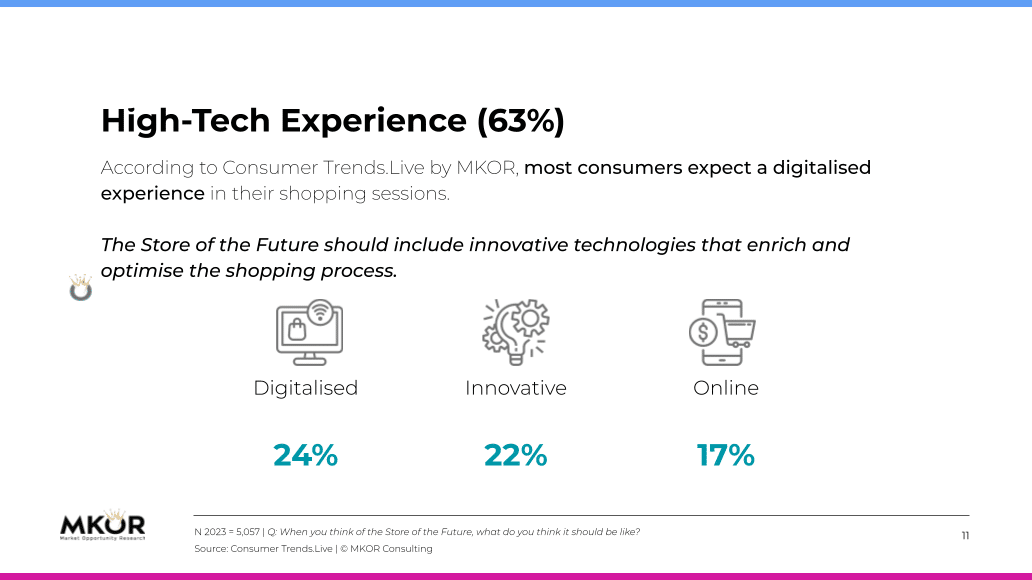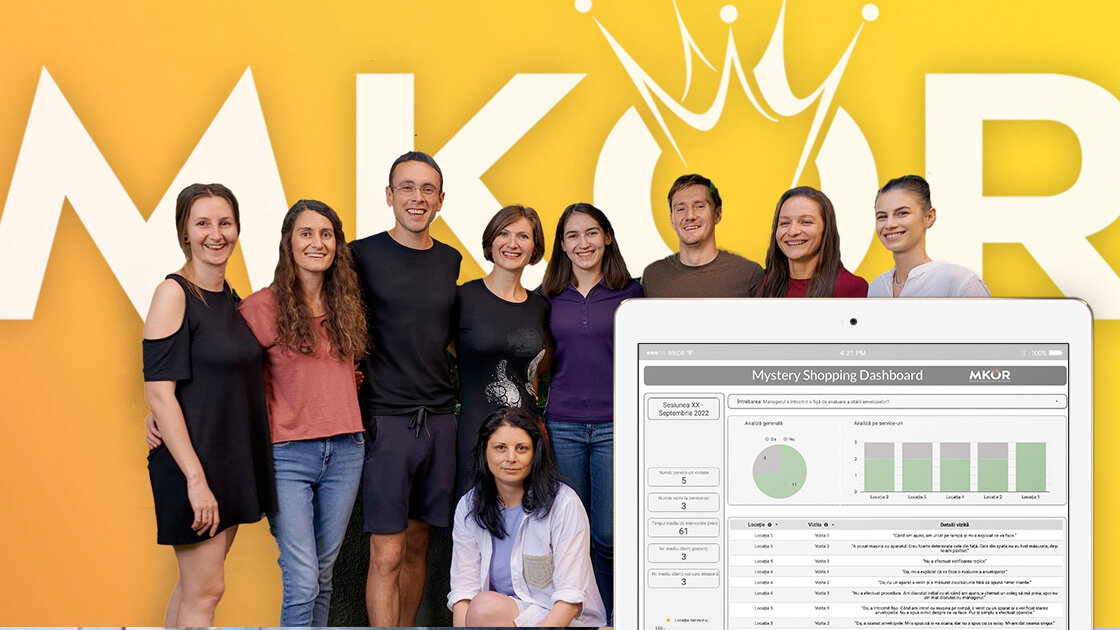Retail trends in Romania for the coming years can be influenced by factors such as economic development, changes in consumer behavior, and technological advancement. To stay competitive, retailers will need to be flexible and adapt to market shifts and consumer preferences.
The results of this study are drawn from Consumer Trends.Live, the first live market study service in Romania. This MKOR service provides access to information and trends in real-time consumer behavior, at the market level.
—
Conținut
The Consumer Trends.Live study is conducted monthly, based on representative national samples by gender, age, and region, and monitors 7 different industries starting with the year 2021:
- Fashion
- IT&C
- Personal care and cosmetics
- DIY Industry
- Electronics and Home Appliances
- Jewelry and watches
- Furniture and decorations
In 2021, we found that over half of Romanians desire a digital experience in their future shopping. In 2022, our study showed that nearly 9 out of 10 consumers (86%) interact with digital technology when shopping. And in 2022, we launched the report of the first real-time market study in the fashion industry in the country – Fashion Consumer Trends.Live.
Consumer Trends.Live analyzes the evolution of consumer markets in Romania and offers access to Romanian consumption habits at any moment with just a click. If you’re active in retail, we invite you to request a Consumer Trends.Live demo to see the impact it could have on your company.
In 2023, we analyzed for this report responses from over 5,000 individuals, and the open-ended responses were overwhelming.
Thus, we used artificial intelligence (AI) for the analysis of this vast amount of data within the Consumer Trends.Live study. This analysis process, part of the MKOR marketing research framework and powered by GPT-4, processed a dataset of over 22,000 open-ended responses.
Drawing inspiration from the idea of using emergent technologies in research, we have created a semi-automated process for analyzing responses with GPT-4. This data analysis method with AI has allowed us to process and categorize responses in a much more efficient and accurate way.
Alex Cimpoca – MKOR Digital Genie
Presentation of Research in Retail about the Store of the Future at Esomar Connect 2023
Cori Cimpoca, the founder of MKOR, presented the results of the “Store of the Future” study at the ESOMAR Connect 2023 conference.
Watch the presentation and learn more about consumers’ expectations and the technological advancements they desire in the store of the future.
What are the most important global trends in retail regarding the store of the future?
The store of the future is an increasingly discussed and anticipated concept in modern society. As technology advances and consumer preferences shift, a vision of what shopping could look like in the future takes shape.
In this context, people imagine an innovative and adaptive commercial environment tailored to their needs, with a strong emphasis on technology and greater consideration for the surrounding environment.
Globally, numerous studies are conducted with the aim of analyzing consumer perceptions.
From the perspective of MKOR, global trends are only partially applicable at the Romanian economic level, and a study adapted to the particularities of Romanians will be more relevant for retail players in our country.
Here are a few global predictions regarding the store of the future:
- The future store will integrate virtual and augmented reality to offer entirely different shopping experiences. Through VR or AR glasses, customers can virtually visit the store, try products, and see how they fit before purchasing.
- With the help of artificial intelligence, stores will be able to anticipate customer preferences and offer personalized recommendations. Chatbots and virtual assistants will be used to provide real-time assistance and to answer customer questions.
- Contactless payment technologies, such as payments made through smartphones or even implantable chips, will become more prevalent. This will make shopping faster and easier, removing the need for physical transactions.
- Stores will employ more robots and automated systems for stock management, cleaning, and assisting with customer service, improving cost efficiency and efficacy.
- Clients will attach more importance to sustainability and social responsibility. The store of the future will focus on eco-friendly and ethical products, and customers will have access to detailed information about product origins and impact.
- Physical stores will need to offer memorable experiences to attract clients. They will organize events, workshops, and exhibitions that merge shopping with entertainment.
- Self-checkout and automated payment technologies will become more widespread, eliminating the need for cashiers.
- The boundaries between offline and online shopping will continue to blur, offering customers the option to order online and either pick up their purchases in-store or return them there.
In Romania, similar trends exist but are aligned with the unique characteristics of the Romanian populace.
Thus, data from the research reveals a 30% increase in demand for high-tech digital and AI experiences from 2021.
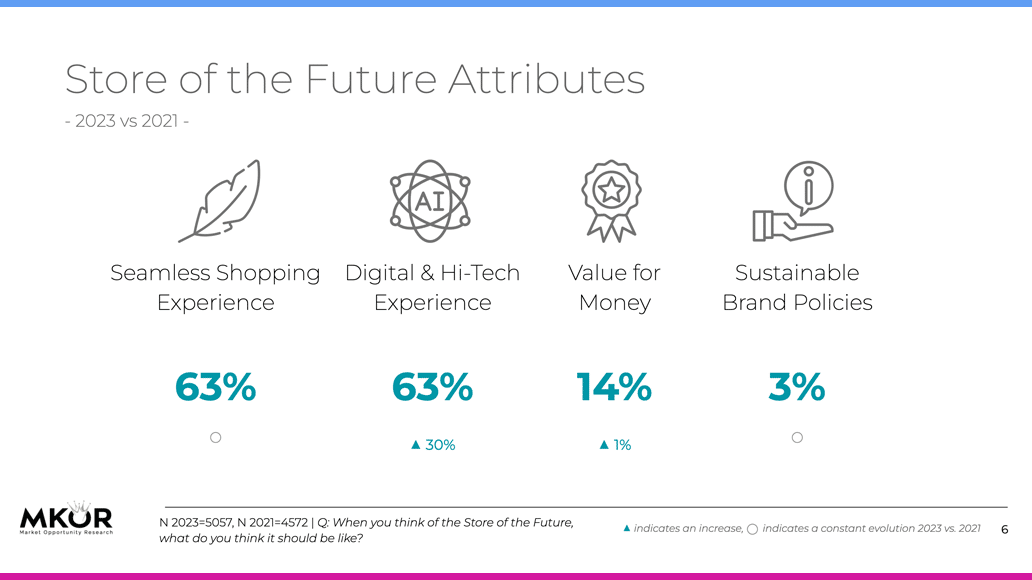
63% of consumers want a pleasant shopping experience
Key directions highlighted by our study show that the Store of the Future should provide a hassle-free shopping experience: a store from which you can buy any goods with quick delivery and easy access:
- Diverse offering – 16%;
- Time efficient – 16%;
- Affordable – 8%.
We could conclude that Romanians desire higher quality products and services in a store that leverages technology to facilitate access to these products and services, as well as to provide a memorable user experience. Price accessibility or a focus on sustainability does not rank among the top expectations of consumers.
According to the Consumer Trends.Live study by MKOR, most consumers still desire a digital experience during their shopping sessions.
Therefore, the Store of the Future should include technologies that optimize the buying process. Romanians expect the store of the future to be:
- Digitalized (24%)
- Innovative from a technological standpoint (22%)
- Online (17%)
Full Access: Download the report "Store of the Future 2023" – and discover the study's results for free
Only 4% of Romanians believe that the store of the future will be based on Artificial Intelligence (AI).
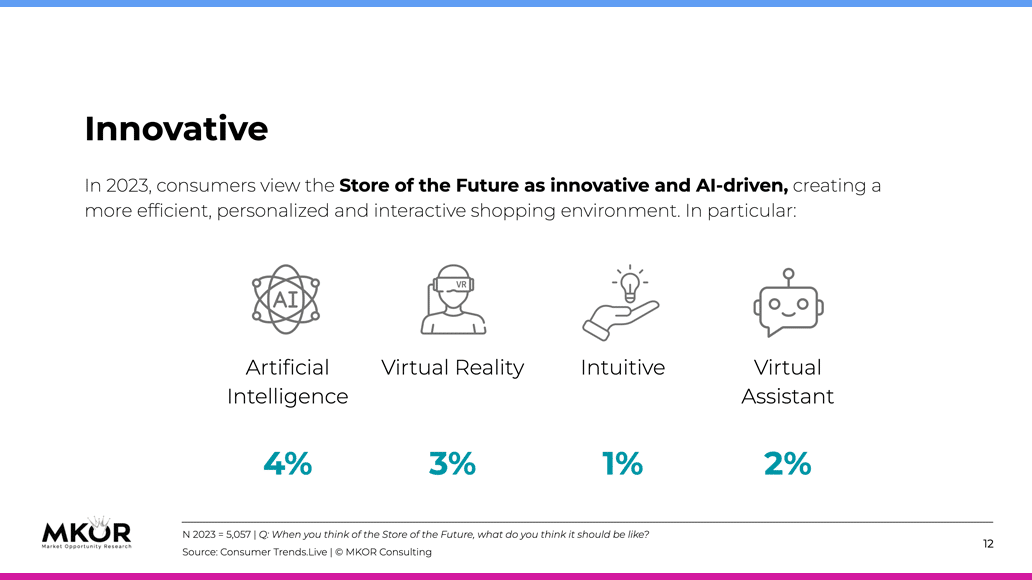
In 2023, consumers believe that the Store of the Future will be based on Artificial Intelligence to contribute to creating a more efficient, personalized, and interactive shopping environment, where technology is used to enhance the customer experience.
The use of artificial intelligence can create a shopping experience based on personalized virtual assistance and virtual fitting rooms.
Online store, virtual fitting room, various payment methods, including in installments, quick delivery are easy. — Woman, 43 years old
Completely online, quick and easy delivery, with many physical centers where you can view the products, with artificial intelligence assistance offered and the possibility of seeing how a product looks in 3D when you access it. — Woman, 23 years old
I believe it should combine the traditional with the modern, so there will be cases where robots and self-service checkouts will place the merchandise quickly, or a robot could take your order for what you need and it will bring, that way we always find consultants to give us advice. — Woman, 25 years old
63% of consumers want a high-tech experience in the Store of the Future.
This process has seen even more growth since 2021, with 30% more people wanting high-tech experiences in the store of the future.
From the Romanian consumers’ perspective, the Store of the Future stands out through its impressive variety of products and services offered, adapted to the needs and preferences of each consumer.
Wide range of products, accessible platform, delivery to easyboxes, promotions (like occasional free delivery, raffles). — Woman, 37 years old
Both online and offline, with cash and card payments, return policy for respected products. — Man, 43 years old
A drive-through for all products. You can drive through the store and scan the products at the checkout with a QR code to pay. — Man, 33 years old
The design that the Store of the Future will adopt focuses on providing a relaxing and comfortable shopping experience, where customers can feel like they’re in a cozy space.
Neat and clean, with a theme that combines metal, glass, and recyclable plastics. Spacious, but without feeling empty. — Man, 33 years old
Without queues, tidy, pleasant. — Man, 45 years old
Simple and organized over many subcategories, to easily find a product. — Man, 54 years old
This aspect can be due to the fact that the orientation towards pleasant experiences is prevalent in more than 6 out of 10 people.
However, 8% of consumers look for affordable prices in the Store of the Future, 5% give importance to quality – price, 1% are interested in promotions, and 3% desire a sustainable experience.
Sustainability, Recyclable Packaging, Organic/Bio Products
A sustainable experience is among the characteristics that respondents wish to see in the Store of the Future, representing an engagement towards an ecological and responsible future. However, the percentage of 3% is small.
We can estimate that this orientation is so low partly because more sustainable products are more expensive, people do not trust the traceability of the products (whether they are truly bio, ecological or more friendly with the environment), and also, there is not yet in Romania a practice well put in place for recycling and reuse.
With products that do not harm the environment, with zero plastic packaging, only with recyclable and reusable packaging, with products that have sustainable production processes. – Woman, 45 years old
Online store, ethical products, sustainability, locally sourced when possible, without unnecessary packaging/plastic, with recycling features or product take-back at the end of their life. – Woman, 26 years old
Increased Attention for Online Shopping
Online shopping is an increasingly sought-after method by consumers for making purchases.
To achieve a higher conversion rate, retailers must respond to consumer preferences and needs.
The main characteristics that customers look for in a store are:
- Quality products
- Special offers
- The existence of a positive experience during shopping sessions
Online shopping has seen significant growth in recent years, and it is expected that this trend will continue. Retailers in Romania should develop and improve their online platforms, offer better shopping experiences, and adapt to the preferences of consumers for online shopping.
Full Access: Download the report "Store of the Future 2023" – and discover the study's results for free
Retail companies will need to offer personalized and attractive shopping experiences, including well-thought-out product recommendations.
Additionally, consumers expect to be able to interact with a retailer in many ways, including online, in-store, and through social media networks. Retailers will use these channels to provide an integrated interaction experience.
A very important aspect, in the context of the growth of online shopping, is that logistics and delivery services will become increasingly important. Retailers will look to optimize delivery processes and offer faster and more convenient options for customers.
These trends can evolve and combine in different ways, but offer a quite realistic perspective on the direction the retail industry is heading in Romania.
Study Information
Sample size: N 2023 = 5,057 | 2021 = 4,572 | 2019 = 1100 | 2017 = 1100
Sample characteristics: Nationally representative based on gender, age, and geographical distribution
Target: General population, 18-65 years old
Format: Opinion survey (CAWI)
Research instrument: Questionnaire
Approach: Online, through MKOR Panel
Period: Jan 2023 – Aug 2023 | Mar 2021 | Oct 2019 | Oct 2017
Have you read everything? Comment / join our newsletter / read our other research posts!
Fashion ROute 2022: data extracted from the first real-time Romanian fashion retail study
August 12, 2022
0 Comments10 Minutes



